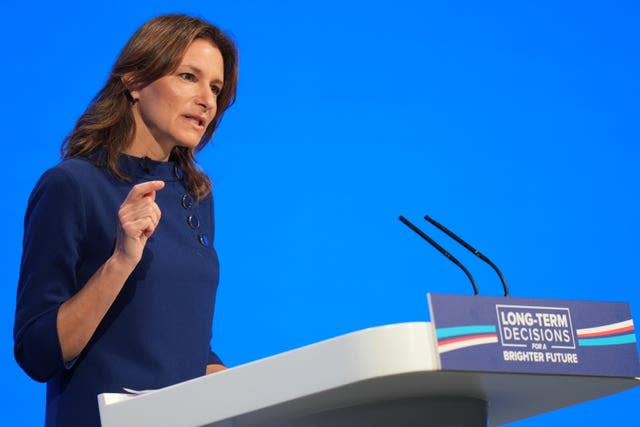BBC licence fee will rise to £169.50, Culture Secretary confirms

The BBC licence fee will rise by £10.50 to £169.50 a year, the Culture Secretary has confirmed as she announced a review into it.
The household payment, which funds much of the corporation’s operations, had been frozen at £159 and was set to rise in line with inflation next year.
However, the expected 9% increase – which would have meant an increase of around £15 from April 2024 – has been reduced, the Government said.
The BBC has already started making £500 million of savings and reassessing its priorities because of the licence fee freeze over the past two years and rising inflation, and the corporation said this announcement will “require further changes”.
An expected funding gap of around £90 million, due to the licence fee not rising more, will be “felt by audiences”, the National Union of Journalists (NUJ) has warned.

Speaking in the Commons on Thursday, Lucy Frazer said the increase will instead be based on September’s consumer prices index (CPI) rate of inflation which was 6.7%. This will mean an increase of £10.50 to £169.50 per year.
She also announced a review into the licence fee model, which will look at alternative funding and report next autumn.
Concerns were raised about the move by opposition and Conservative MPs.
Ms Frazer said: “The review will look at how we can ensure the funding model is fair to the public, sustainable for the long term and supports the BBC’s vital role in growing our creative industries.”
She suggested the BBC licence fee could be replaced by an alternative funding model, although such an outcome would depend on the review and a public consultation and would be part of the charter review process.
Ms Frazer said: “The review will include looking at how the BBC can increase its commercial revenues to reduce the burden on licence fee-payers.
“Given pressure on household incomes, I can explicitly rule out that this review will look at creating any new taxes.
“The findings of the review will support the Government to make an informed choice on whether to consult the public on moving to alternative funding models.
*Announcement*: 📢 I have today announced that Dr Samir Shah is the Government’s preferred candidate for the position of BBC chair.
My statement 👇: pic.twitter.com/uCJgWkolL3
— Lucy Frazer (@lucyfrazermp) December 6, 2023
“This would take place as part of the charter review process, where any final decision on reforming the BBC’s funding model would be taken.”
She also said that the Government is supporting the BBC to “realise commercial opportunities which will make it more financially sustainable and we’ll continue to explore these provisionally” with the corporation.
Ms Frazer added: “This situation clearly shows the need to consider the BBC’s funding arrangements to make sure they are fair for the public and sustainable for the BBC.”
The news comes after the veteran TV executive Dr Samir Shah was named on Wednesday as the Government’s preferred candidate to become BBC chairman.
The BBC board said in a statement: “We note that the Government has restored a link to inflation on the licence fee after two years of no increases during a time of high inflation.
“The BBC is focussed on providing great value, as well as programmes and services that audiences love. However, this outcome will still require further changes on top of the major savings that we are already delivering.
“Our content budgets are now impacted, which in turn will have a significant impact on the wider creative sector across the UK.
“We will confirm the consequences of this as we work through our budgets in the coming months.”
Shadow culture secretary Thangam Debbonaire said the reduction in an increase in the fee will make “no material difference” to those struggling with the cost-of-living crisis while SNP MP John Nicolson said the Government is to blame for the “mismanagement of the economy”.
Mr Nicolson told the Commons: “In the years to come the BBC may need a different funding format, but that time is not now.”
During the debate, Father of the House Sir Peter Bottomley said Parliament should have been involved in the Government’s decision.
The Conservative MP for Worthing West said: “The BBC needs defenders, I am one of them.
“As long as I’m here, the Government can expect to get detailed attention and a great deal of support for things which are sensible.”
Former shadow chancellor John McDonnell questioned whether the move was “revenge” for ministers being grilled on BBC Radio 4’s Today programme by presenters such as Nick Robinson.
The Labour MP for Hayes and Harlington also said: “As a result of this cut there will be a loss of journalistic jobs at a key time when we’re going to a general election and they’re desperately needed.”
Last month, the BBC announced that Newsnight will be reduced to a 30-minute programme, axing more than half of the show’s 60 jobs, amid a raft of changes to save the news division £7.5 million.
An extended hour-long edition of BBC News At One will relocate to Salford, Greater Manchester, while BBC Breakfast, also broadcast from the city, will be extended by an extra 15 minutes daily.
BBC statement in relation to the Government’s funding model review
➡️ https://t.co/m035q9BBQp pic.twitter.com/H7pcuesu9Y
— BBC Press Office (@bbcpress) December 7, 2023
In October, the corporation announced that Doctors will end in 2024 amid “super inflation in drama production” and earlier this year it said 1,000 fewer hours of new TV programmes would be broadcast in 2023.
Other cost-cutting measures include moving a number of World Service TV and radio broadcast services online and merging the domestic and global news channels.
The terms of the licence fee review also state that it will look at whether the BBC should have more commercial operations and what they should be and how the corporation can transition to a new funding model.
In a statement, the corporation said it is “absolutely right that we debate” how the BBC is funded as it continues the role of projecting “the UK’s values across the globe, while also producing impartial news, and telling stories through our content that reflect the real lives of people across” the nation.
It added: “That role should not be separated from the debate about funding.
“We believe that public service should be at the heart of the BBC, and we need to ensure that if there are changes, that the public fully understands the implications of them, so that we all have a BBC that everyone can support and benefit from.”
The Government said it is committed for the licence fee to remain until the current Charter period ends in December 2027.
A No 10 spokeswoman said: “We know that family budgets are stretched and that’s why the Government has stepped in. We’ve done that following two years of licence fee freezes and we’ve acted to minimise this year’s increase to less than £1 per month.”
Baroness Stowell, chairwoman of the House of Lords Communications and Digital Committee, welcomed the Government statement and said she was “disappointed” the BBC had not done more work to address the corporation’s challenges.
She added: “Our report was clear that decisions about funding mechanisms have to be led by a clear articulation of what the country wants from its national broadcaster, and how it will change for that to be delivered.
“The BBC needs to be more open and front-footed in setting that out, or else face change being imposed upon it.”
Paul Siegert, NUJ broadcasting organiser, said changes to the BBC World Service, BBC Local and the corporation’s news and current affairs programme along with more cuts would be “felt by audiences”.
He also said: “This 13th-hour change to funding – coming two years into the existing agreement – makes it very difficult for the BBC to plan and keep within budgets.
“Cuts in funding mean cuts in programmes and output.”

 Yahoo News
Yahoo News 
